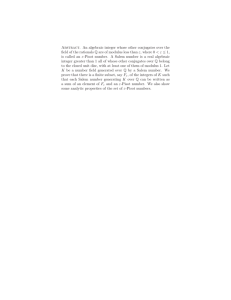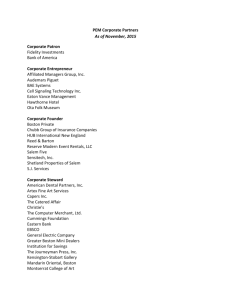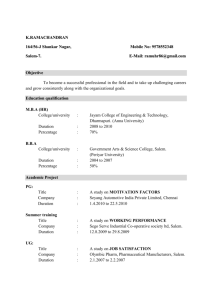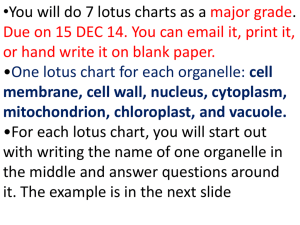Learning Outcomes • Mahasiswa akan dapat menghitung penyelesaian model permainan berbagai contoh aplikasi/kasus.
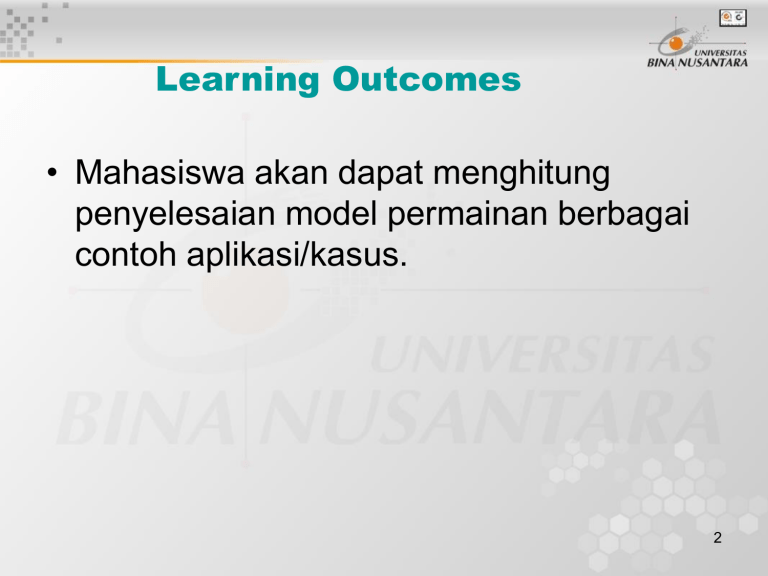
Learning Outcomes
• Mahasiswa akan dapat menghitung penyelesaian model permainan berbagai contoh aplikasi/kasus.
2
Outline Materi:
• Konsep Dasar permainan
• Model Permainan
• Aturan model Permainan
• Equiliribium & Strategy.
• Contoh kasus..
3
Finding the reaction curves
• Reaction curve: given the output of X, what output of Y is optimal?
• Of course, whatever Y does, will produce further reactions, i.e. X is not constant in general.
• Equilibrium only when both firms „ sit
“ on their reaction curves: no surprises and no incentive to alter the behavior
4
Prisoner’s dilemma
Possible strategies for Mulloy
Possible strategies for Jones
Confess
Confess
Jones: 8 years
Mulloy: 8 years
Do not confess
Jones: 10 years
Mulloy: 2 years
Do not confess
Jones: 2 years
Mulloy: 10 years
Jones: 4 years
Mulloy: 4 years
5
One-shot games vs. Repeated games I
• Assume a cartel game: 2 firms want to set the price high to maximize profits in the cartel.
– But each firm has an incentive to cheat and reduce its price
– Cooperation is very difficult to establish if players interact only once
(one-shot game)
– Only Nash-equilibrium is low/low .
• Why is it that you do observe cartels (cooperation) in real life???
– Players in real life do not interact only once, they interact more often
– Benefits of cooperation are higher if agents can interact more often
• Repeated game: gains from cooperation are much higher
6
One-shot vs. Repeated games II
• Suppose game goes on for several periods
– If one player cheats, the other can punish him later (set also a low price)
– Tit-for-tat strategy : each player should do, what the other did in the previous round: solves cooperation problem
– Does it work also, if there are only 10 periods?
• Use backward induction (i.e. look at last period!)
• End-game problem
7
Does cheating pay?
Possible strategies for Farmer
Possible strategies for Acron
Abide by agreement
Abide by agreement
Cheat
Acron
’ s
P
: $5 million Acron
’ s
P
: -$2 million
Farmer
’ s
P
: $5 million Farmer
’ s
P
: $8 million
Cheat Acron
’ s P : $8 million Acron
’ s P : $2 million
Farmer
’ s P : -$2 million Farmer
’ s P : $2 million
8
Most-favored-customer clauses
1. If the firm reduces its price subsequent to a purchase, the early customer will get a rebate so that he or she will pay no more than those buying after the price reduction
2. Or: you get a rebate, if you see the product cheaper somewhere else. ==> Bestpreisgarantie
• Looks like a very generous (consumer-friendly) device.
• But: clever agreement to keep cartel discipline alive.
• U.S. Justice Department sees such clauses as
“ tacit coordination
” between oligopolists
9
Payoff Matrix before
Most-favored-customer clause
10
Payoff Matrix after
Most-favored-customer clause
11
Non-credible threats
Assume: Gelhart wants to deter price cut by rival by a commitment of retaliation
Possible strategies for LIV
Possible strategies for Gelhart
Low price High price
Low price
Gelhart
’ s
P
: $2 million
LIV
’ s
P
: $3 million
Gelhart
’ s
P
: $3 million
LIV
’ s
P
: -$1 million
High price
Gelhart
’ s
P
: $7 million
LIV
’ s
P
: $11 million
Gelhart
’ s
P
: $11 million
LIV
’ s
P
: $8 million
Gelhart will lose money by retaliating. Maybe reputation of being “reckless”
(regardless of costs) could help.
12
Example for non-credible threat: NATO nuclear strategy
• Mutually assured destruction: in case of a first strike by the Russians, U.S. threatens to retaliate by basically destroying the world.
• But after the first strike, this strategy is not credible anymore, because payoffs for U.S. will further fall.
• Remedy: construct automatic counter-attack device
==> serves as a self-binding commitment device
13
Deterrence of entry I
Salem has first move
Possible strategies for Lotus
Possible strategies for
Salem
Enter Do not enter
Resist entry
Lotus’s P
: $3 million
Salem’s P
: $6 million
Lotus’s P
: $13 million
Salem’s P
: $9million
Do not resist entry
Lotus’s P
: $4 million
Salem’s P
: $12 million
Lotus’s P
: $13 million
Salem’s P
: $9 million
14
Deterrence of entry II
Lotus makes credible threat to resist: excess capacity
Possible strategies for Lotus
Possible strategies for
Salem
Enter Do not enter
Resist entry
Lotus’s P
: $3 million
Salem’s P
: $6 million
Lotus’s P
: $11 million
Salem’s P
: $9million
Do not resist entry
Lotus’s P
: $2 million
Salem’s P
: $12 million
Lotus’s P
: $11 million
Salem’s P
: $9 million
Excess capacity decreases Lotus’ profits in 3 out of 4 cases
15
Case study
In the 1960s, Procter and Gamble recognized that disposable diapers could be made a mass-market product, and developed techniques to produce diapers at high speed and correspondingly low cost. The result: it dominated the market. According to Harvard’s
Michael Porter, who has made a careful study of this industry, the following were some ways in which Procter and Gamble might have signalled other firms to deter entry.
Tactic
1. Signal a commitment to defend position in diapers through public statements, comments to retailers, etc.
2. File a patent suit
Cost to P and G
None
Cost to entrant
Raises expected cost of entry by increasing probability and extent of retaliation
3. Announce planned capacity expansion
4. Announce a new generation of diapers to be introduced in future.
Legal fees Incurs legal fees plus probability that P and G wins the suit with subsequent cost to the competitor
None Raises expected risk of price cutting and the probability of
P and G’s retaliation to entry.
None Raises expected cost of entry by forcing entrant bear possible product development and changeover costs contingent on the ultimate configuration of the new generation
16
Decision tree
Expand
HP Compaq = $50
HP = $50
Expand
Don’t expand
Compaq = $150
HP = $60
Compaq
Expand
Compaq = $60
HP = $120
Don’t expand
HP
Don’t expand
Compaq = $80
HP = $80
Compaq acts first: but resolve the tree from right to left!
17
Other fun games
• Battle of the sexes
• Sam and Dolly would like to go out on
Saturday night:
• Either to Disco or to
Boxing, but together would be better
• Coordination pays
• Chicken game
• John and Jack race with the car against each other
• See „Rebel without a cause“ with James
Dean
18
19
